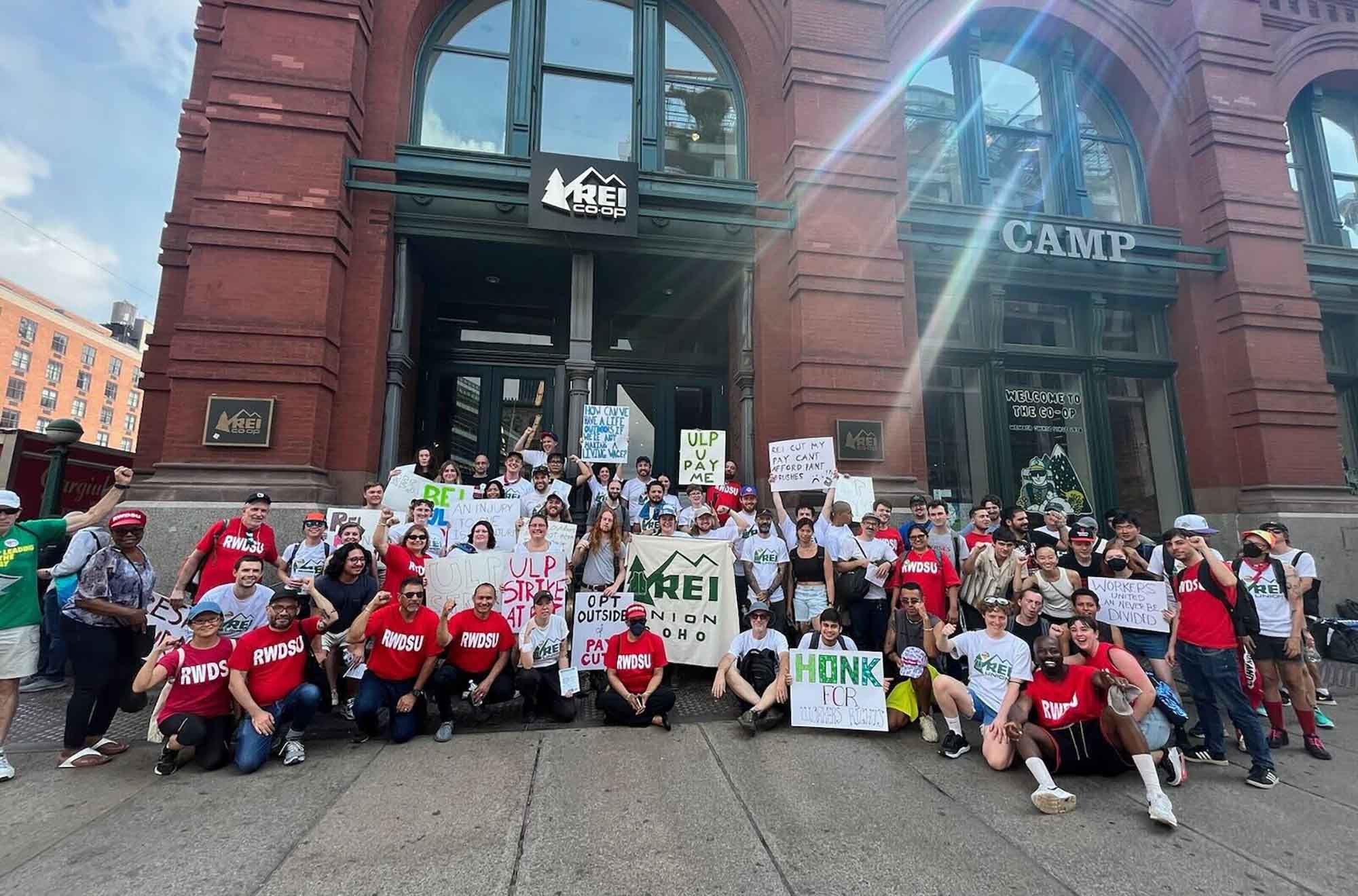Dozens of REI workers staged a walkout today during peak hours at the company’s flagship store in Manhattan.
Carrying signs reading “Opt Outside of Pay Cuts!” and brandishing their union banner, many of the location’s employees left around 1 p.m. — effectively closing down the store about the same time as the New York Labor Day Parade.
They’re protesting what they call “retaliatory” behavior from REI’s leaders, who rescinded pay increases for the store’s employees this summer after a temporary agreement. The protest represents the latest escalation in an on-going legal fight between REI and employees at the SoHo location, which became the first REI store to unionize in March 2022.
Since then, at least seven other REI locations voted to form unions. REI management has repeatedly stated they don’t believe unions are necessary, with CEO Eric Artz saying unions at REI aren’t “the right thing.”
“I believe the presence of union representation will impact our ability to communicate and work directly with our employees and resolve concerns at the speed the world is moving. And that is the core of why we don’t think that introducing a union is the right thing for our employees,” Artz said in what NPR called a “corporate podcast.”
In an official statement on Friday, REI said organizers could have their increased pay if they agreed to not strike. Instead, unionized workers have taken to the streets, demanding that REI reinstate their wages and return to the bargaining table.
“From my perspective, this is retaliatory,” Steve Buckley, a member of the store’s bargaining committee, told GearJunkie. “We were engaging in our rights, and they retaliated by punishing workers.”
In a statement responding to Saturday’s protest, REI said its leaders remain “committed to continuing to bargain in good faith.”
“It is not clear why union organizers have sought to inflame tensions around the routine legal process between REI and the union,” an REI spokesperson said

REI Says Union Refuses to Cooperate
In December 2022, REI reached a temporary deal with SoHo workers through their representatives at the Retail, Wholesale and Department Store Union (RWDSU).
The newly unionized employees would not go on strike in exchange for receiving the same pay increase as the rest of the company. That was a “temporary” agreement that ended June 1, according to an official statement from REI.
When RWDSU would not agree to an extension of that agreement, REI revoked the additional pay, the company said.
“It has always been clear and understood between REI and the RWDSU/employee bargaining committee that these pay raises were temporary for the duration of the agreement,” REI said in a statement. “REI is committed to continuing to bargain in good faith with the RWDSU and our employees in the SoHo store.”
RWDSU, however, says that REI is not actually interested in negotiations. On June 1, the same day the temporary agreement ended, REI hired new legal counsel Morgan Lewis — the same firm that fought against unions for Amazon. It was Lewis that informed RWDSU of the revoked pay increases.
Buckley said he saw his hourly pay go from $22.45 to $19.76 — a cut of nearly $3 an hour.
“They would give us the money if we stopped participating in our legally protected actions, like handing out fliers outside the store or talking to customers about what’s happening with the union,” Buckley said. “They’re ratcheting up the punishment on SoHo right now because they think that’s the best way to discourage other organizations.”

Union: More Problems Than Just Pay
REI’s decision to revoke the pay increases resulted in immediate reactions from RWDSU and the SoHo workers this summer.
The union filed charges of unfair labor practices against REI and created an online petition with 5,045 people supporting their demand for restored pay. The SoHo workers also started a Hardship Fund on GoFundMe soon after losing their pay raises. With a $75,000 goal, it has raised a little less than $9,000 over the last few months.
RWDSU has repeatedly said that REI’s leaders are much less willing to meet with organizers than they claim publicly. Since mid-May, “REI has only met with SoHo workers on four occasions,” RWDSU said in a press release Friday.
While pay rates are certainly an issue, that’s not the only problem between REI and its growing number of unionized employees, organizers said. They claim that many workers struggle to get consistent work hours from week to week, making it impossible to know how much money they’ll actually earn each month. Other accusations against REI, which include threatening workers and disciplining or firing organizers, have been denied by company leaders.
The result is that the two groups are no closer to a collective bargaining contract than a year ago. While workers point to the company’s record $3.9 billion of sales in 2022, the company’s president still said the year was a loss as a result of giving out pay raises.
A general trend toward unionization throughout the outdoor industry — from climbing gyms to ski patrols to national parks — shows that something is changing, Buckley said.
“This is a moment of time when the outdoor industry is due for a little bit of a reckoning,” Buckley said. “We’re jumping from job to job to make a living while holding up a huge industry. We deserve some predictability in our jobs. Workers across the industry are ready to address the economic disparity that we’ve experienced for so long.”








